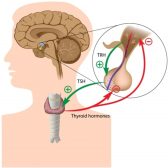Definition
noun, plural: corticosteroids
A steroid hormone produced by the adrenal cortex, e.g. glucocorticoids and mineralocorticoids
Supplement
A corticosteroid is one of the major steroid hormones. Other steroid hormones include sex steroids and anabolic steroids.
Corticosteroids belong to a group of steroid hormones that are produced naturally in the adrenal cortex by steroidogenesis in response to the release of adrenocorticotrophin or adrenocorticotropic hormone from the pituitary gland.
Corticosteroids may be classified into groups based on their predominant biological activity. The major groups of corticosteroids are glucocorticoids and mineralocorticoids. Glucocorticoids have effects on carbohydrate, fat, and protein metabolism. Examples are cortisol and cortisone. Mineralocorticoids affect the regulation of electrolyte and water balance. Example is aldosterone. Some corticosteroids, though, demonstrate both types of activity in varying degrees.
Corticosteroids may also be produced synthetically. Examples of synthetic corticosteroids are prednisone, prednisolone, methylprednisolone, and dexamethasone. They are used in the treatment of certain cases of leukemia. They are also administered to patients to suppress graft rejection and graft-versus-host disease after bone marrow transplant.
They may also be used clinically for hormonal replacement therapy, for suppression of ACTH secretion by the anterior pituitary, as antineoplastic, anti-allergic and anti-inflammatory agents, and to suppress the immune response. Thus, they may also cause adverse effects such as increased risk of infection.
Synonym(s):
- adrenocortical hormone
- corticoid
See also:
Related term(s):
- Corticosteroid side-chain-isomerase
- Corticosteroid-binding globulin
- Corticosteroid-induced acne
- Corticosteroid-induced glaucoma
- Corticosteroid-induced striae

